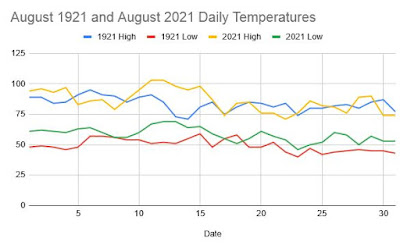Of all the imagery from the fires last year, it was the orange, even apocalyptic, sky right here that has most stayed in memory.
 |
| A year ago, via Twitter |
There's plenty being written about the fire, especially about rebuilding in the canyon, but still not enough about the larger context of climate disruption.
Earlier this year, in the "Climate Vulnerability Assessment Highlights," the City and project team published some modeling for the average year in the 2050s.
 |
| Blowing past the prediction from January 2021 |
It suggested that "Days with temperatures greater than or equal to 90°F will increase by 26 days, from 7 days (1990s) to 33 days (2050s)."
Today marked our 40th day of 90°F heat in 2021.
 |
| Sept. 8th, 1921 |
It's true that 2021 is going down as a record year. But this year's record will soon be surpassed and will with time fall closer and closer to any new average. At this point, it is very likely that we will hit the average of 33 days of 90°F much sooner than the 2050s. Change is happening faster than this "Assessment" suggests.
The summary also omits what might be the more significant change, the warming drift in our average low temperatures at night.
Exactly 100 years ago, the paper published another weather summary, and the change in a century, even with the caveats of a small sample size, is striking.
Comparing August 2021 to 1921, this year our daily highs averaged 2.6° warmer. More dramatically, our lows averaged nearly 9° warmer. The nighttime warmth, the lack of cooling off, is the big difference.
 |
| Highs were 2.6 degrees warmer on average (red) and lows 8.8 degrees warmer (blue) in 2021 compared to 1921 in August |
Here are the highs and lows for both years. The highs don't offer that much separation, but the lows were clearly lower in 1921.
 |
| 2021 lows in green nearly always above 1921 in red |
You might remember that highs in our July were 11° warmer and lows were 5.1° warmer than the daily average temperatures in July of 1921.
And none of this includes 117° in June.
 |
| 117 degrees on June 28th, 2021 |
So cherry-picking July and August in 1921 doesn't by itself prove anything about climate. But in the context of everything else we know, the direct comparison over a century does illustrate our changing, warming climate.
It's a lot warmer now, and it's going to get even warmer over the next few years and decades. In not very many years, this year's "record" heat will seem normal, our reactions quaint.
An amount of change is already baked in. But to ensure it's not worse, we have to change now. Council will hold a formal Work Session later on the 20th, and there will be more to say closer to that date. But our current Climate Action Plan concepts do not seem at all adequate to the moment.


No comments:
Post a Comment